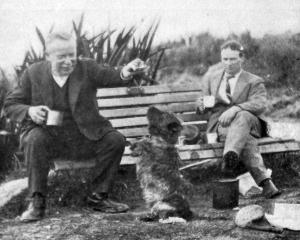The labour difficulty, writes a Hawke's Bay correspondent of a Wellington journal, has been considerably minimised by the employment of girls, who, like their sisters in the towns, have come to the rescue, but this time not with pen and typewriter, but with a hayrake.
The farmers employing such labour express themselves entirely satisfied with the results.
The girls are paid at the rate of 1s 6d an hour, and usually work in four-hour shifts.
Some of them make excellent cheques, and thoroughly enjoy the unusual work.
They are employed principally in stooking, stacking, and haymaking, and have in many cases proved themselves excellent substitutes for their "brothers under arms.''
• It would not appear that there are many more eligible soldiers left in Brunswick street, South Dunedin, judging by the number who have already enlisted from that street.
On Thursday, January 13, the following Brunswick street men left for camps in the north: - J. W. Huggins, W. Thomson, C. A. Eadie, W. Cousins, A. Hill, L. Popham, and W. Brown.
The following men from the same street left in previous forces: - A. Logie, A. Brown, A. Douglas, Sergeant-major Black, C. Popham, W. Carruthers, A. Cotton, A. Parker.
• A proposal to construct a 20ft concrete track between Wellington and Petone for the sole use of motorists was discussed at a meeting of the Hutt County Council on Thursday.
The scheme was outlined by Mr Morton, at a meeting of the Hutt Road Board.
The chairman of the council (Mr M. W. Welch) declared that such a scheme was ridiculous.
The racing of motor vehicles on the Hutt road was bad enough in its present state, but, in his opinion, the racing speed mania would be far worse if motorists were provided with a smooth track solely for their own use.
He informed the council that he would strongly oppose such a scheme when it came up for discussion at a special general meeting of the Hutt Road Control Board.
• The monotony of the railway journey on the Lakes express was varied slightly on Tuesday (states the Lake County Press).
Included in the personal luggage of a well-known Gore solicitor was a canary in a small cage, which had been placed in the luggage rack.
On arrival at Riversdale he made the discovery that both cage and bird had disappeared, and then commenced a search of the train, the representative of the legal fraternity being assisted by the train officials and many of the passengers.
The search, however, was fruitless, and telegrams to Gore and other stations failed to locate the missing bird.
The mystery was solved on arrival at Kingston, when the solicitor, on removing his coat from the rack, found the cage resting beneath the garment.
When the discovery was announced the passengers and the railway officials breathed sighs of relief, while the owner of the bird went aboard the steamer, rejoicing.
• Now that high-class stone fruits of all kinds are coming in to Dunedin in increasing quantities from Central Otago and the Teviot, it is suggested to us that housewives would do well to take the opportunity of making larger stocks of jam than usual, while the fruit and sugar are comparatively cheap.
Butter is already high in price, and it is impossible to say what the winter price will be.
Good jam is one of the healthiest and the most nutritious foods for growing children, and it is needless to say that there is nothing better than the home-made article. - ODT, 19.1.1916.
• COPIES OF PICTURE AVAILABLE FROM ODT FRONT OFFICE, LOWER STUART ST, OR WWW.OTAGOIMAGES.CO.NZ












